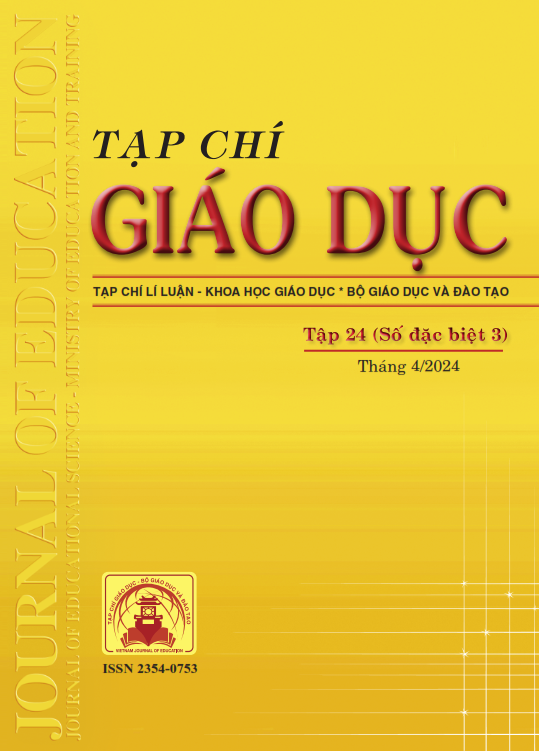Thiết kế tình huống dạy học chủ đề “Thống kê” (Toán 11) nhằm phát triển năng lực số cho học sinh trung học phổ thông
- Từ khóa:
- Digital literacy
- teaching Statistics
- Math 11
Tóm tắt
Digital literacy is an increasingly important concept in the current digital transformation context. Digital literacy refers to the ability to use technology and digital tools and the ability to search, evaluate, and apply information effectively. Mathematics is one of the subjects that offers many opportunities for students to develop digital literacy, especially in the topic of “statistics,” which involves tasks related to real-life situations. In this article, we clarify the concept of digital literacy and, based on the analysis of pedagogical suggestions to help develop digital competence for students in teaching mathematics, propose two teaching situations in mathematics under the theme of “statistics” to develop digital literacy for high school students. These suggestions aim to enhance students' learning positively activities in teaching Grade 11 Mathematics.
1. Mở
Tài liệu tham khảo
Bona, A. S. D., Basso, M. V. de A. (2010). Construção de portfólios de matemática usando pbworks. Revista Novas Tecnologias Na Educação, 8(3). https://doi.org/10.22456/1679-1916.18060
Bùi Văn Nghị, Nguyễn Tiến Trung (2013). Một số quan điểm về việc thiết kế tình huống dạy học môn Toán ở trường trung học phổ thông theo hướng nâng cao tính tích cực nhận thức của học sinh. Tạp chí Giáo dục, 312, 45-50.
Darmawan, F., Hakim, A., & Novita, S. (2024). Game-based learning media training for early childhood for 21st-century teachers. ETHOS: Jurnal Penelitian Dan Pengabdian Kepada Masyarakat, 12(1), 31-42. https://doi.org/10.29313/ethos.v12i1.3181
Draganac, D., Jović, D., & Novak, A. (2022). Digital competencies in selected european countries among university and high-school students: Programming is lagging behind. Business Systems Research, 13(2), 135-154. https://doi.org/10.2478/bsrj-2022-0019
Eriyagama, I. S. K., & Mohammed, L. A. (2024). Mathematics Teacher’s Perceptions on Flipped Classroom towards the 21st Century Learning and Innovation Skills. International Journal of Research and Innovation in Social Science, 8(2), 258-262.
Eshet-Alkalai, Y. (2004). Digital Literacy: A conceptual framework for survival skills in the digital era. Journal of Educational Multimedia and Hypermedia, 13, 93-106.
Ferrari, A. (2013). Digital competence in practice: an analysis of frameworks. Joint Research Centre of the European Commission., 91. https://doi.org/10.2791/82116
Kallas, K., & Pedaste, M. (2022). How to improve the digital competence for e-learning? Applied Sciences (Switzerland), 12(13). https://doi.org/10.3390/app12136582
Kocabatmaz, H., & Saraçoğlu, G. K. (2024). The effect of educational digital games on academic success and attitude in 3rd grade mathematics class. Participatory Educational Research, 11(2), 230-244. https://doi.org/10.17275/per.24.28.11.2
Kumala, F. N., Nita, C. I. R., Yasa, A. D., Ghufron, A., Pujiastuti, P., & Rahayu, C. P. (2021). Digital literacy analysis of elementary-school students in Malang. Proceedings of the 2nd Annual Conference on Social Science and Humanities (ANCOSH 2020), 542, 126-130. https://doi.org/10.2991/assehr.k.210413.030
Law, N., Woo, D., de la Torre, J., & Wong, G. (2018). A global framework of reference on digital literacy skills for indicator 4.4.2. Information Paper No51, 51, 146. https://uis.unesco.org/sites/default/files/documents/ip51-global-framework-reference-digital-literacy-skills-2018-en.pdf
Mursidi, A., Buyung, B., & Murdani, E. (2022). Student digital literacy in Singkawang School Through 5M activities for independent learning. Journal of Educational Science and Technology (EST), 8(3), 165. https://doi.org/10.26858/est.v8i3.35797
Niyibizi, O., & Teachers, V. (2024). Teachers ’ use of ICT facilities in mathematics education. International Journal of Studies in Education and Science, 5(2), 140-149.
Nguyễn Thị Xiêm (2023). Một số vấn đề về khung năng lực số cho học sinh trung học phổ thông trong chương trình giáo dục phổ thông 2018. Tạp chí Giáo dục, 23(2), 12-18.
Reddy, P., Sharma, B., & Chaudhary, K. (2020). Digital literacy: A review of literature. International Journal of Technoethics, 11(2), 65-94. https://doi.org/10.4018/IJT.20200701.oa1
Rudykhina, O. V. (2024). Cognitive-stylistic and metacognitive characteristics of schoolchildren and students with different indicators of digital competence. Perspektivy Nauki i Obrazovania, 67(1), 507-523. https://doi.org/ 10.32744/pse.2024.1.28
Semeniako, Y., Mardarova, I., Lystopad, O., Rybak, О., Samoilenko, V., & Hrechanovska, O. (2024). Strengthening students’ proficiency in digital technologies and the SMART society. Revista Romaneasca Pentru Educatie Multidimensionala, 16(1), 608-622. https://doi.org/10.18662/rrem/16.1/840
Spante, M., Hashemi, S. S., Lundin, M., & Algers, A. (2018). Digital competence and digital literacy in higher education research: Systematic review of concept use. Cogent Education, 5(1), 1-21. https://doi.org/10.1080/ 2331186X.2018.1519143
Trịnh Thị Phương Thảo, Trịnh Thanh Hải, Lê Minh Cường, Đỗ Bảo Châu, Trần Trung (2024). Năng lực số của học sinh trung học phổ thông ở Việt Nam, Tạp chí Giáo dục, 24(6), 6-11.
Umoh, J. B., & Akpan, E. T. (2014). Challenges of blended E-Learning tools in mathematics: Students’ perspectives University of Uyo. Journal of Education and Learning, 3(4). https://doi.org/10.5539/jel.v3n4p60
Đã Xuất bản
Cách trích dẫn
Số
Chuyên mục
Giấy phép

Tác phẩm này được cấp phép theo Ghi nhận tác giả của Creative Commons Giấy phép quốc tế 4.0 .












